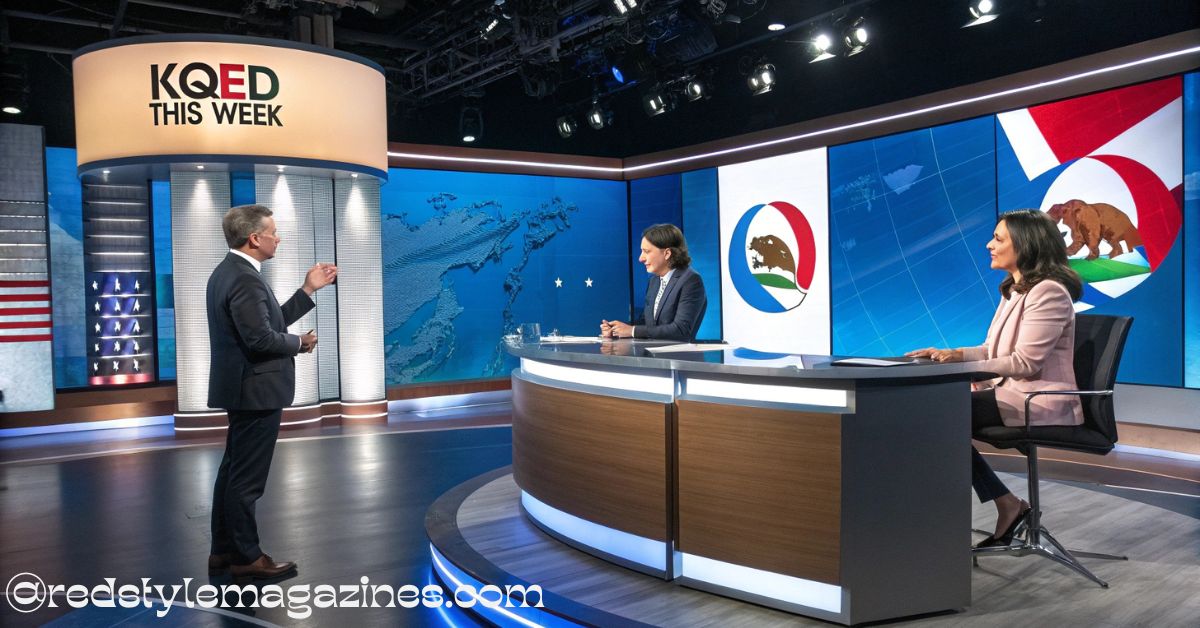KQED This Week David Spark Carla Marinucci is a leading California politics show featuring expert analysis and interviews. Hosted by seasoned journalists David Spark and Carla Marinucci, it delivers insightful coverage of key state issues. Stay informed with weekly updates on California’s evolving political landscape.
Stay tuned with us as we dive deep into everything you need to know about KQED This Week David Spark Carla Marinucci — from expert political insights to behind-the-scenes stories that shape California’s future.
Introduction to KQED This Week David Spark Carla Marinucci
KQED This Week David Spark Carla Marinucci is more than just a public affairs program—it’s a cornerstone of political journalism in California. In a time when local politics directly shape everything from housing to climate action, this show offers an in-depth, balanced view of the state’s most pressing issues. Hosted by two of California’s most respected political minds, David Spark and Carla Marinucci, the program provides audiences with sharp analysis, exclusive interviews, and thoughtful discussion. Whether you’re a long-time California resident or someone keen to understand how state decisions ripple across the nation, this show is a trusted source of insight.
The format is engaging, the content timely, and the voices diverse. Every episode captures the complexity of California politics in a way that’s accessible and informative for viewers of all backgrounds. With political discourse often dominated by soundbites, KQED This Week breaks the mold by offering context, clarity, and compelling conversation. Let’s dive deeper into what makes this show a must-watch for anyone following the Golden State’s political journey.
The Hosts of This Week in California Politics: KQED This Week David Spark Carla Marinucci
David Spark and Carla Marinucci are at the heart of KQED This Week, and their combined expertise drives the program’s integrity and appeal.
David Spark is a veteran journalist and media strategist known for his clear-headed analysis and ability to explain complex issues in simple terms. He has worked across various media formats and has a deep understanding of how digital media and politics intersect. His background in technology and communications allows him to frame political stories in a way that resonates with today’s fast-paced, information-driven world.
Carla Marinucci brings unmatched depth to California political coverage. As a seasoned reporter with decades of experience covering Sacramento and national elections, she’s known for her incisive interviews and authoritative voice. Prior to joining KQED This Week, she was the senior writer for Politico’s California Playbook, where she became one of the most trusted political voices in the state.
Together, Spark and Marinucci make a formidable team. Their conversations are not only informative but also engaging and nuanced. They balance journalistic rigor with a conversational tone that keeps viewers interested, even when the topics are complex. This synergy between the hosts is one of the key reasons why the show continues to earn the trust of its audience.
A Brief History of the Show
KQED This Week was launched with a vision to bridge the gap between political decision-making and the general public. It emerged as a reliable platform during a time when local news coverage was shrinking and public demand for trustworthy journalism was growing. From its earliest episodes, the show aimed to break down barriers between politicians and constituents by fostering transparency and open dialogue.
Initially, the program focused on key policy updates from Sacramento and interviews with political insiders. Over time, however, it evolved into a more inclusive forum that welcomes diverse voices—from community organizers to state lawmakers—each offering unique insights into the forces shaping California.
When David Spark and Carla Marinucci joined the show, they brought with them a renewed sense of purpose and an expanded vision. Their leadership helped modernize the program’s tone, format, and digital reach. They introduced new segments and widened the scope of discussion to include national policies affecting California, further establishing the show’s credibility as a vital source of political analysis.
KQED This Week has since become a staple of political discourse in the state, adapting to shifting political tides while staying committed to truth, context, and citizen empowerment.
The Format and Topics Covered on the Show
The structure of KQED This Week David Spark Carla Marinucci is designed to be both comprehensive and accessible. Each episode typically runs around 30 minutes and is divided into key segments that cover the most critical political developments of the week.
The show’s format blends analysis, field reporting, and interviews, providing a well-rounded view of the issues. Topics vary widely but consistently center on subjects that directly impact Californians. These include:
- Housing affordability and zoning laws
- Environmental policy and climate initiatives
- Education reform and budget allocation
- Public health and healthcare access
- Immigration and border policy
- Local election updates and ballot initiatives
What makes the format stand out is the hosts’ ability to dig deeper. Rather than merely report headlines, they explore the motivations behind policies, question their long-term effects, and invite guests who offer different viewpoints. This ensures that the show remains balanced and reflective of California’s diverse political landscape.
Another strength is the show’s adaptability. It responds to breaking news while still maintaining editorial depth, making each episode timely and insightful.
Interviews with Key Political Figures
One of the most impactful elements of KQED This Week David Spark Carla Marinucci is its high-quality interviews. Each episode typically features a conversation with a politician, policymaker, or thought leader, shedding light on decisions made behind closed doors.
These interviews go beyond scripted answers. Spark and Marinucci are skilled at drawing out candid responses and pressing for clarity. Their questioning style is respectful yet probing, which leads to revealing insights that rarely surface in traditional press conferences.
Guests on the show have included California Governors, State Senators, members of Congress, city mayors, and leaders of major advocacy groups. These conversations are particularly valuable because they often address hot-button issues like homelessness, police reform, water rights, and economic inequality.
The show also ensures representation of voices outside of government. Community organizers, educators, healthcare professionals, and young activists are given the platform to share their perspectives. This diversity enriches the dialogue and helps viewers form a more holistic understanding of how policy affects real lives.
These interviews are not just informative—they help hold public officials accountable, prompting transparency in governance.
Impact on the Local Community
KQED This Week has a profound impact on California communities by promoting civic engagement and informed citizenship. The show plays a unique role in bridging the information gap between government institutions and the people they serve.
For many viewers, the show is a trusted source that clarifies how legislation and policies will influence their daily lives. Whether discussing housing ordinances in San Francisco or wildfire prevention strategies in rural counties, the program highlights regional concerns often ignored by national media.
By showcasing a broad range of community voices, the show also gives visibility to local movements and grassroots activism. For instance, segments on climate justice have amplified youth-led environmental campaigns. Similarly, discussions about education reform have featured teachers and parents who are typically absent from statewide political narratives.
The hosts often receive feedback from viewers who say the show inspired them to attend town halls, contact their representatives, or participate in local elections. That ripple effect is one of the show’s greatest contributions—it not only informs but empowers Californians to act.
In a polarized media landscape, KQED This Week stands out for its commitment to accuracy, inclusivity, and constructive dialogue.
Future Plans for This Week in California Politics
Looking ahead, KQED This Week David Spark Carla Marinucci is preparing to expand its scope and audience engagement. The show plans to introduce more interactive formats, including live-streamed Q&A sessions where viewers can submit questions to guests in real time.
Upcoming episodes will also feature special investigative segments focusing on critical issues such as election integrity, AI in governance, and the future of California’s energy grid. These long-form reports aim to offer deep dives that complement the weekly political updates.
David Spark and Carla Marinucci are also exploring collaborations with other regional news organizations to widen coverage and bring underreported stories to light. More efforts will be made to include younger audiences by integrating social media content, short video explainers, and educational mini-series aimed at first-time voters.
Another exciting development is the potential for bilingual programming to reach California’s vast Spanish-speaking population. This will ensure that more residents can access critical political information in their preferred language.
These plans reflect the show’s mission to remain responsive to public needs and continuously evolve with the changing media landscape.
How to Watch or Listen to the Show?
Watching KQED This Week David Spark Carla Marinucci is easy and flexible. The show airs weekly on KQED Public Television, typically on Friday evenings. Check your local TV listings for exact broadcast times.
For digital viewers, full episodes are available on-demand through the KQED.org website. The site also features supplementary materials such as episode transcripts, related articles, and behind-the-scenes footage.
If you prefer listening on the go, the show is also available as a podcast. Search “KQED This Week” on platforms like Spotify, Apple Podcasts, Google Podcasts, and others. The audio version is optimized for mobile listening and includes all the key segments from the televised show.
KQED also maintains an active presence on social media platforms like X (formerly Twitter), YouTube, Instagram, and Facebook, where they post show highlights, quotes, and upcoming topics. Following these channels is a great way to stay informed and engaged.
Whether you’re watching on TV, streaming online, or listening during your commute, the show ensures accessibility for all audiences across California and beyond.
Conclusion
KQED This Week David Spark Carla Marinucci has carved out a vital space in California’s media landscape. By combining in-depth reporting, dynamic interviews, and thoughtful commentary, the show empowers viewers to stay informed and engaged. With its clear mission, strong hosts, and dedication to representing diverse voices, it continues to be a beacon of trustworthy political journalism in an era of misinformation.
Whether you’re a student, voter, policymaker, or simply curious, tuning in to this program offers valuable perspectives on the complex issues that shape the Golden State. With exciting plans ahead, KQED This Week is set to remain a relevant, reliable, and essential guide to California politics.
FAQ’s
Q1: Who are the hosts of KQED This Week?
David Spark and Carla Marinucci are the co-hosts, both respected journalists with deep expertise in California politics.
Q2: What topics does the show cover?
The show covers state politics, including housing, climate, healthcare, education, and more, with expert commentary and interviews.
Q3: Can I watch the show online?
Yes, full episodes are available on the KQED website and can also be streamed as a podcast on Spotify and Apple Podcasts.
Q4: How does the show benefit the community?
It informs citizens about vital issues, promotes civic engagement, and amplifies underrepresented voices across California.
Q5: Are there plans to expand the show’s format?
Yes, future episodes may include live Q&As, bilingual segments, and deeper investigative reporting to reach more audiences.
Also read:
- Sherrell Huggins Clay Chalkville High School: The Truth!
- Kniko Howard: Everything to Know About Draya Michele’s Firstborn
- Ford Mustang Stablemate: History, Models & Modern Evolution!




